Queen, World Leaders Honor Veterans on 75th Anniversary of D-Day
About 300 World War II veterans, ages 91 to 101, are lauded at a large-scale Portsmouth ceremony attended by President Trump among others.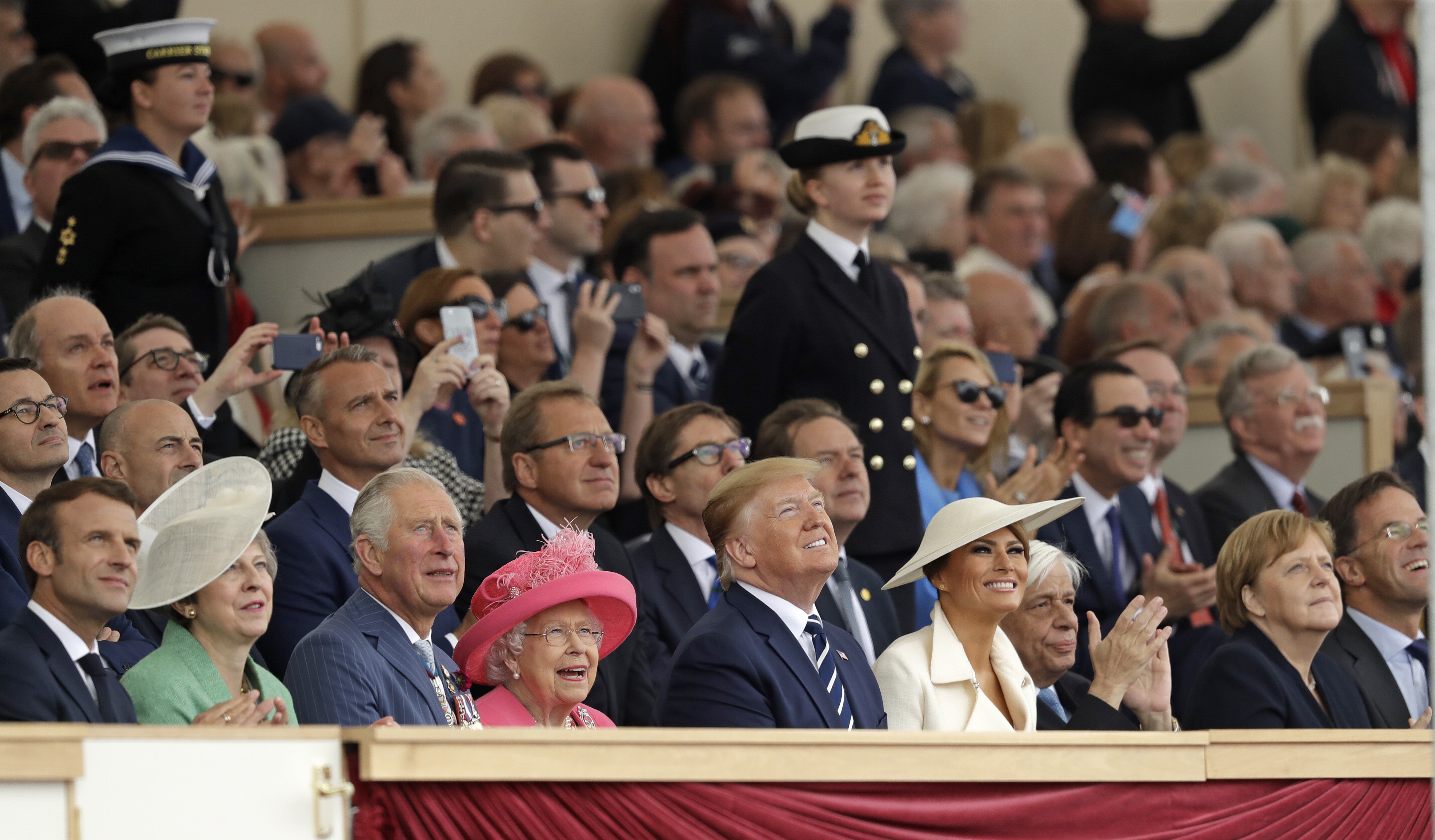 From left, French President Emmanuel Macron, British Prime Minister Theresa May, Britain's Prince Charles, Queen Elizabeth II, President Donald Trump, first lady Melania Trump, Greek President Prokopis Pavlopoulos, German Chancellor Angela Merkel and Dutch Prime Minister Mark Rutte watch a military fly-past at the end of the ceremony marking the 75th anniversary of D-Day in Portsmouth, England. (Matt Dunham/AP)
From left, French President Emmanuel Macron, British Prime Minister Theresa May, Britain's Prince Charles, Queen Elizabeth II, President Donald Trump, first lady Melania Trump, Greek President Prokopis Pavlopoulos, German Chancellor Angela Merkel and Dutch Prime Minister Mark Rutte watch a military fly-past at the end of the ceremony marking the 75th anniversary of D-Day in Portsmouth, England. (Matt Dunham/AP)
PORTSMOUTH, England—Queen Elizabeth II and world leaders including U.S. President Donald Trump gathered Wednesday on the south coast of England to honor the troops who risked and sacrificed their lives 75 years ago on D-Day, a bloody but ultimately triumphant turning point in World War II.
Across the Channel, American and British paratroopers dropped into northwestern France and scaled cliffs beside Normandy beaches, recreating the daring, costly invasion that helped liberate Europe from Nazi occupation.
With the number of veterans of World War II dwindling, the guests of honor at an international ceremony in Portsmouth were several hundred men, now in their 90s, who served in the conflict — and the 93-year-old British monarch, also a member of what has been called the “greatest generation.”
The queen, who served as an army mechanic during the war, said that when she attended a 60th-anniversary commemoration of D-Day 15 years ago, many thought it might be the last such event.
“But the wartime generation — my generation — is resilient,” she said, striking an unusually personal note.
“The heroism, courage and sacrifice of those who lost their lives will never be forgotten,” the monarch said. “It is with humility and pleasure, on behalf of the entire country — indeed the whole free world — that I say to you all, thank you.”
About 300 World War II veterans, aged 91 to 101, attended the ceremony in Portsmouth, the English port city from where many of the troops embarked for Normandy on June 5, 1944.
Mixing history lesson, entertainment and solemn remembrance, the ceremony was a large-scale spectacle involving troops, dancers and martial bands, culminating in a military fly-past. But the stars of the show were the elderly veterans of that campaign who said they were surprised by all the attention: They were just doing their jobs.
“I was just a small part in a very big machine,” said 99-year-old John Jenkins, a veteran from Portsmouth, who received a standing ovation as he addressed the event.
“You never forget your comrades because we were all in it together,” he said. “It is right that the courage and sacrifice of so many is being honored 75 years on. We must never forget.”
The event, which kicked off two days of D-Day anniversary observances, paid tribute to the troops who shaped history during the dangerous mission to reach beachheads and fight in German-occupied France.
D-Day saw more than 150,000 Allied troops land on the beaches of Normandy in northwest France on June 6, 1944, carried by 7,000 boats. The Battle of Normandy, codenamed Operation Overlord, was a turning point in the war, and helped bring about Nazi Germany’s defeat in May 1945.
Wednesday’s ceremony brought together presidents, prime ministers and other representatives of more than a dozen countries that fought alongside Britain in Normandy.
The leader of the country that was the enemy in 1944, German Chancellor Angela Merkel, also attended— a symbol of Europe’s postwar reconciliation and transformation.
Russian President Vladimir Putin, who attended 70th anniversary commemorations in France five years ago, has not been invited. Russia was not involved in D-Day but was instrumental in defeating the Nazis on the Eastern Front.
The ceremony sought to take people back in time, with world leaders, reading the words of participants in the conflict.
Trump read a prayer that President Franklin D. Roosevelt delivered in a radio address on June 6, 1944, extolling the “mighty endeavor” Allied troops were engaged in.
British Prime Minister Theresa May read a letter written by Capt. Norman Skinner of the Royal Army Service Corps to his wife, Gladys, on June 3, 1944, a few days before the invasion. He was killed the day after D-Day.
“Although I would give anything to be back with you, I have not yet had any wish at all to back down from the job we have to do,” he wrote.
French President Emmanuel Macron read from a letter sent by a young resistance fighter, Henri Fertet, before he was executed at the age of 16 years old.
“I am going to die for my country. I want France to be free and the French to be happy,” it said.
The ceremony ended with singer Sheridan Smith performing the wartime hit “We’ll Meet Again,” as many of the elderly assembled veterans sang along.
Then WWII Spitfire and Hurricane fighter jets, modern-day Typhoons and the Royal Air Force’s Red Arrows aerobatic unit swooped over the dignitaries, veterans and large crowd of spectators.
The crowd beyond the security barriers loved the planes but loved the veterans even more. Whenever their images came up on the big screen, people cheered. The former servicemen have reacted to such shows of attention with humility and surprise, as many believed they had been forgotten.
“What happened to me is not important. I’m not a hero. I served with men who were,” said Les Hammond, 94, who landed at Juno Beach with the Royal Electrical Mechanical Engineers. “I’m very lucky I’m a survivor.”
On Thursday the focus shifts to France, where commemorations will be held at simple military cemeteries near the Normandy beaches. Some 300 British veterans will cross the Channel by boat to the beaches overnight, just as they did 75 years ago.
Events in France began early Wednesday morning with U.S. Army Rangers climbing the jagged limestone cliffs of Normandy’s Pointe du Hoc to honor the men who scaled them under fire 75 years ago.
They were recreating a journey taken in 1944 by the U.S. Army’s 2nd and 5th Ranger Battalions to destroy Nazi guns atop the cliffs, helping prepare the way for Allied troops to land on the coast.
Elsewhere in Normandy parachutists jumped from C-47 transporters in WWII colors and other aircraft, aiming for fields of wild flowers on the outskirts of Carentan, one of the early objectives for Allied troops.
Among the jumpers was American D-Day veteran Tom Rice, 97. He jumped into Normandy with thousands of other parachutists in 1944 and recalled it as “the worst jump I ever had.”
Like many other veterans, Rice said he remains troubled by the war.
“We did a lot of destruction, damage. And we chased the Germans out and coming back here is a matter of closure,” he said. “You can close the issue now.”
___
Follow all the AP’s coverage of D-Day at https://apnews.com/WorldWarII
___
Lawless reported from London. John Leicester in Carentan, France, Milos Krivokapic in Pointe du Hoc, France and Gregory Katz in London contributed.
Your support is crucial…With an uncertain future and a new administration casting doubt on press freedoms, the danger is clear: The truth is at risk.
Now is the time to give. Your tax-deductible support allows us to dig deeper, delivering fearless investigative reporting and analysis that exposes what’s really happening — without compromise.
Stand with our courageous journalists. Donate today to protect a free press, uphold democracy and unearth untold stories.

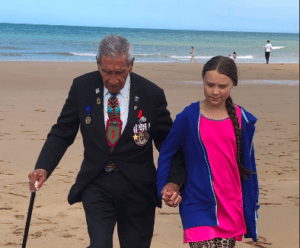
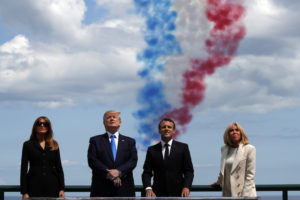
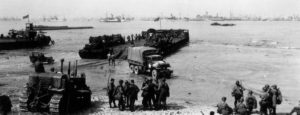
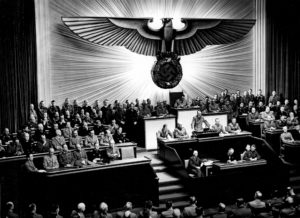
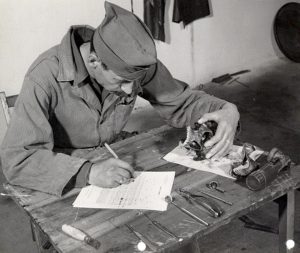
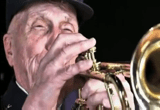
You need to be a supporter to comment.
There are currently no responses to this article.
Be the first to respond.